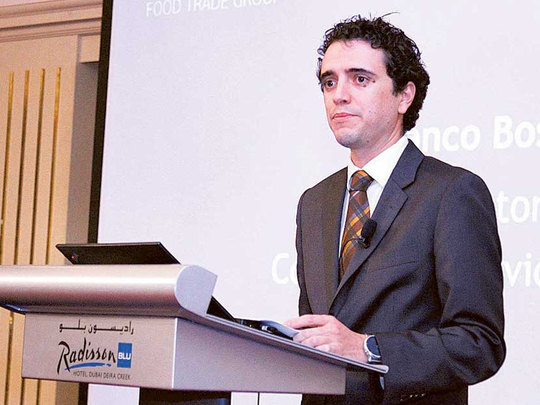
Dubai: An industry grouping of foodstuffs trading firms has been set up in Dubai and which would act as a dispute redressal forum. The Food Trade Group will function under the umbrella of DMCC (Dubai Multi Commodities Centre) and will also have on board overseas businesses operating in the same line.
The announcement will carry a lot of weight in local trading circles, given the number of instances of foodstuffs trading firms going bust in the last two years and their owners leaving behind a sizeable pile of unpaid debt. Some estimates suggest this could be well over Dh500 million. (It is part of a wider malaise that principally affected small and medium businesses in the UAE after banks turned more stringent on their credit exposures. The downturn in the economy also exacerbated the situation for traders.) The FTG has “developed dispute resolution services with a view to create a solution that is anchored in Dubai but addresses a global issue,” said Franco Bosoni, Director — Commodity Services at DMCC. “By bringing companies of all sizes under one umbrella and encouraging the industry to agree to agree on a set of regulatory guidelines, we aim to create a culture of trust and a sense of unity.
Corporate governance
“Dispute resolution services and contract support in the trade can create a more transparent and compliant environment for companies as they in turn have access to a set of services, guidelines and mediation counsel — that ultimately contributes to enhanced corporate governance.”
In the main, the DMCC Food Trade Group will aim to raise awareness of potential obstacles as well as provide guidance to address potential disputes through mediation services.
Apart from businesses in foodstuffs, the new grouping will also be reaching out to banks and other stakeholders in the trade. Rather than working with select banks or partners, we are aiming to welcome a large group of local and global banks and other financial institutions to support greater financing and risk mitigation for this sector,” said Bosoni.
“We have met with representatives from the UAE Banks Federation to ensure we build a platform that can be widely adopted — and recognised — by the banking sector as a vehicle for growth.”
According to DMCC research, introducing mediation services can be “highly effective” in resolving issues with an over 80 per cent success rate in reaching a settlement. DMCC Food Trade Group’s members as well as non-members will be able to use the mediation service.
“The last few years have witnessed several major disagreements among food trading organisations,” said Bosoni. “Recent economic uncertainty across the globe has meant it has become harder for companies to raise funds and, as a result, to pay invoices. This can create a sense of distrust and lack of confidence in the market.
“In general, ability to meet debt obligations are often affected by changes to the business turnover cycles, price fluctuations and cash conversion cycles and so forth.”
Efficient mechanism
On whether it wouldn’t have been better to set up a grouping open only to local players, the official said: “The flow of commodities trade is truly international. Through the DMCC Food Trade Group, we aim to develop a platform that serves the purposes of local and global companies that are looking to benefit from a greater connection to the Middle East markets and get access to efficient dispute resolution mechanism.”
According to Dhananjay Datar, Managing Director of Al Adil Trading, “There has been some respite in recent months in the number of payments defaults within the food trade sector. It is a definite improvement on the situation in 2014 and 2015, which was when the maximum number of skips and business closures took place.
“These days, the trade is also moving with extreme caution — no longer are we seeing 60-90 days of credit being extended to retailers. These days, it’s more likely to be capped at 30.
“But, there has also been improvement in the inventory levels of foodstuff traders, unlike in 2014 and 2015. This too has proved a major plus.”
Factbox: What the Food Trade Group aims to achieve
* The Group will address critical needs such as the industry’s need for better access to finance. In the longer term this will be addressed by tailoring DMCC’s existing tools and services, such as Tradeflow, an online platform for registering ownership of commodities, which facilitates asset-backed commodity murabaha transactions. New products could be introduced to support commodity finance.
* DMCC is also in talks with financial institutions, insurance providers and professional services firms to organise events to provide guidance and support for food traders to get better access to finance. “To enhance financing options available in the market it is critical to work with banks and other financial institutions that are in position to support the sector,” said Franco Bosoni, Director — Commodity Services at DMCC. “We have demonstrated to the industry how we can create value and support businesses by providing a stable environment for financing.
“DGCX [Dubai Gold and Commodities Exchange] is an example of this as it gives its clients the opportunity to trade on fully regulated and transparent platform, which in turn eliminates counterparty risk (and) which in turn improves how financial institutions manage risk.”












